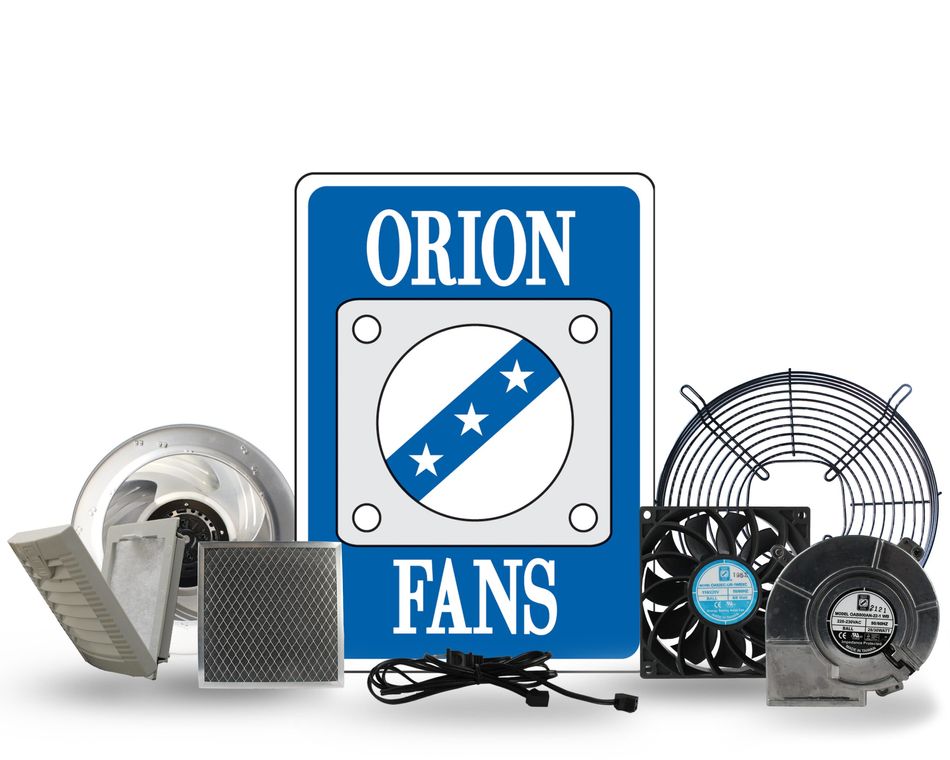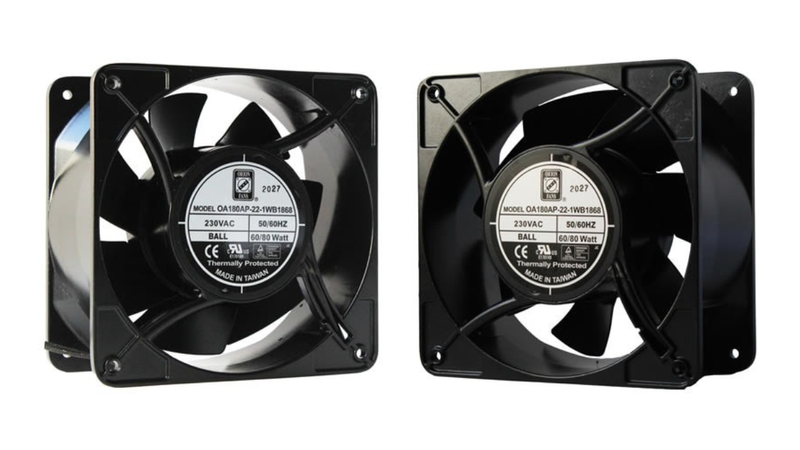The Impact of Cooling on System Performance: Lessons from Orion Fans
Wevolver spoke with Orion Fans President, John Knight, to learn about the cooling challenges companies face, how their technologies address system reliability, and where innovation is heading in thermal management.
From telecommunications to industrial automation, the demand for reliable thermal management has never been higher. As systems grow denser and more compact, overheating and cooling inefficiencies have emerged as critical barriers to performance and longevity. At the center of tackling these challenges is Orion Fans, a leading provider of AC, DC, and EC fan solutions tailored for a wide range of industries.
Wevolver spoke with Orion Fans President, John Knight, to learn about the cooling challenges companies face, how their technologies address system reliability, and where innovation is heading in thermal management.

What are the most common cooling issues faced by your customers, and how do your solutions help improve system reliability?
John Knight: Simply, overheating. As systems become more compact and power densities increase, effective cooling becomes critical to avoid thermal stress that can degrade performance, shorten component lifespan, and cause unexpected failures. Across industries such as telecom, automotive, and industrial automation, maintaining sufficient airflow and managing heat within confined spaces are key challenges to ensuring system reliability.
To address these demands, Orion Fans offers a wide range of high-performance AC, DC, and EC models, each engineered to meet cooling requirements specific to every sector. Our fans are designed to optimize airflow, minimize energy consumption, and maintain reliable operation even in harsh or mission-critical environments, helping to prevent downtime, improve overall system efficiency, and extend equipment lifespan.
What are some of the key performance considerations that go into tailoring your AC, DC, and EC fans for specific industry use cases?
John Knight: Effective thermal management is not a one-size-fits-all. Different industries place unique demands on cooling systems, requiring a careful balance between performance, efficiency, and environmental factors. When tailoring fans for specific use cases, we prioritize several key performance factors:
Airflow: We ensure that the fan's airflow is precisely matched to the system's thermal load. Higher airflow is critical in high-power or densely packed systems, where rapid heat removal is essential. In contrast, lower airflow may be preferred in sensitive environments to avoid overcooling or unnecessary turbulence.
Efficiency: Energy consumption directly impacts system cost and sustainability. Our EC fans are highly efficient, offering significant energy savings through optimized power usage, which is a major advantage in sectors like telecom, where operational costs and long-term energy efficiency are key concerns.
Noise: In environments where acoustic comfort is important, such as medical devices, office equipment, or consumer electronics, minimizing noise without sacrificing thermal performance is essential. Our fans are engineered to deliver quieter operation while maintaining the necessary cooling levels to protect system components.
What measures has Orion Fans implemented to achieve industry-leading lead times and stock availability, and how do they benefit your customers?
John Knight: Speed and availability are critical in today's fast-moving industries. Supply chain disruptions and extended lead times can significantly impact project timelines and operational continuity. To support our customers’ need for rapid delivery, we have invested heavily in advanced manufacturing technologies, including automation and flexible production systems that enable faster turnaround without sacrificing quality.
Our automated inventory management systems ensure real-time tracking of stock levels and customer demand trends, allowing us to anticipate needs and maintain a ready supply of our most popular products. Additionally, our strategic partnerships with global suppliers help secure critical components and materials, mitigating risks from market fluctuations or regional shortages.
By optimizing every aspect of our supply chain from production to fulfillment and maintaining an extensive, strategically located inventory, we can respond quickly to urgent customer demands. This ensures customers have reliable access to the products they need, minimizes downtime, and supports smoother, more efficient operations across a wide range of industries.
In what ways do capabilities like customization options and inventory management programs enhance your service offerings to clients?
John Knight: Meeting diverse cooling needs often requires more than off-the-shelf solutions. We designed our value-added services to deliver tailored support that addresses the specific performance, design, and operational goals of each customer. We offer customization options across fan size, voltage, airflow, and other specifications to ensure optimal integration into unique system architectures, whether space constraints, specialized thermal loads, or environmental challenges are at play. This customization allows customers to achieve more precise and reliable thermal management outcomes.
In parallel, our inventory management programs help streamline the supply chain by maintaining optimal stock levels, reducing procurement lead times, and minimizing the risk of supply shortages. For industries where consistent availability is critical to keeping production schedules and minimizing downtime, these programs offer significant operational advantages. By combining engineering flexibility with supply chain support, we help clients improve efficiency, control costs, and maintain high system reliability levels across a range of applications.
Can you discuss the significance of your IP68 and IP69K-rated fans in maintaining system performance in harsh or demanding environments?
John Knight: Our IP68 and IP69K-rated fans can perform in the harshest environments, where exposure to dust, moisture, and even high-pressure water is common. These ratings ensure that our fans can continue to operate reliably in challenging conditions, such as outdoor installations, industrial machinery, or vehicles subjected to extreme weather. The durability and protection provided by these fans help maintain system performance, prevent failures, and increase the overall lifespan of critical equipment, providing peace of mind for customers working in demanding industries.
Maintaining system performance in harsh environments requires cooling solutions that can withstand exposure to elements that would compromise standard equipment. Our IP68 and IP69K-rated fans are specifically engineered to operate reliably in conditions involving heavy dust, moisture, and even direct, high-pressure water jets. These are hazards commonly encountered in sectors like industrial automation, transportation, agriculture, and outdoor telecommunications.

The IP68 rating certifies complete protection against dust ingress and extended submersion in water, making these fans ideal for applications where exposure to rain, flooding, or humid environments is a risk. The IP69K rating further ensures resistance to high-pressure, high-temperature washdowns, which are crucial in environments such as food processing or heavy industrial settings where equipment must withstand regular cleaning or extreme weather conditions.
By preventing contaminants from compromising fan performance, these rugged designs help maintain consistent thermal management, avoid unexpected system shutdowns, and extend the service life of critical equipment. For customers operating in demanding or unpredictable conditions, our high-protection fans offer not just durability but also operational peace of mind.
How do your fan trays and accessories support broader system performance and integration needs in customer applications?
John Knight: Our fan trays are engineered to simplify the assembly of multiple fans into a single, compact solution, providing uniform airflow across rack-mounted systems, data enclosures, and industrial cabinets where heat can quickly accumulate. By offering modularity and standardized mounting options, fan trays also reduce installation time and support easier maintenance and replacement.
Beyond fan trays, accessories like air filters, speed controllers, and protective guards play a key role in enhancing the overall efficiency, safety, and lifespan of cooling systems. Filters help maintain clean airflow by trapping dust and debris, which can otherwise reduce cooling effectiveness and damage sensitive components over time. Controllers allow for dynamic adjustment of fan speed based on real-time thermal conditions, improving energy efficiency and extending fan life. Guards add a layer of mechanical protection, ensuring safe operation and compliance with industry standards.
Together, these integrated solutions not only optimize cooling performance but also help customers reduce system complexity, improve reliability, and streamline the design and upgrade process, whether for new builds or retrofits across industrial, telecom, or computing environments.
With the expansion of your manufacturing facilities, how has Orion Fans improved its ability to meet global demand?
John Knight: Expanding our manufacturing facilities has significantly strengthened our ability to support global customer demand with faster and more reliable service. By increasing production capacity, we can respond to larger order volumes and a broader range of product customization requests without compromising lead times or quality.
Through strategically placed production and warehousing sites across key regions, we minimize shipping distances, reduce delivery times, and lower associated logistics costs. All of this helps our customers accelerate project timelines and maintain leaner inventory models. Additionally, a more distributed manufacturing footprint enhances supply chain resilience, allowing us to better navigate regional disruptions and ensure consistent product availability even during periods of high demand or material shortages.
This expanded capability directly supports our customers' operational needs by improving access to critical cooling components, enabling faster system builds, and ultimately helping maintain business continuity across industries that rely on dependable thermal management.
Looking ahead, what innovations is Orion Fans focusing on to continue leading in thermal management solutions?
John Knight: We are committed to continuous innovation to help customers meet their thermal management challenges. We are currently advancing our next-generation EC fan technology to deliver even greater energy efficiency and quieter operation, key factors as industries aim to lower operational costs and meet stricter energy efficiency standards.
In parallel, we are developing smart fan solutions with IoT integration, enabling real-time monitoring, predictive maintenance, and more dynamic system control. These capabilities allow customers to optimize cooling performance, extend equipment life, and reduce unexpected downtime.
Looking ahead, we will expand our product lines with fans designed for even greater durability and adaptability in harsh environments, supporting a wider range of applications where extreme conditions are becoming more common. Through these innovations, we aim to empower our customers with smarter, more resilient, and more sustainable thermal management solutions.
When customers come to you with performance issues, are there any misconceptions about what a fan can or can’t solve?
John Knight: One common misconception is that simply adding a more powerful fan will resolve system cooling challenges. In reality, effective thermal management requires a holistic, system-level approach that considers airflow optimization, proper fan placement, heat dissipation paths, and the thermal behavior of all critical components.
Without a well-designed cooling strategy, even the most powerful fan may fail to eliminate localized hotspots, leading to reduced component reliability, higher maintenance costs, and shorter system lifespans. While a fan is a vital part of the solution, it cannot fully compensate for poor thermal architecture or inadequate heat sinking.
We frequently work with customers to review and refine their overall thermal management strategies, ensuring that fans operate as part of an integrated system to deliver consistent, reliable cooling performance.
Closing the Performance Gap with Smarter Cooling
Orion Fans continues to lead the way in delivering reliable and efficient thermal management solutions across various industries. Through advanced fan technologies, smart system integration, and resilient supply chain strategies, they help customers address the growing demands of high-performance, compact, and mission-critical systems. As system demands grow further, companies can look to Orion Fans for expertise that ensures performance, durability, and future-ready cooling strategies.

